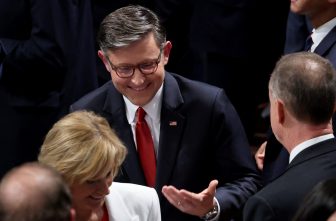
The MCC, which advocates on behalf of the state’s Catholic bishops for public policies and programs that support the life and dignity of every human person, has identified several priorities for the session that began Jan. 4:
» Advocating for a state constitutional amendment defining marriage as a union between one man and one woman.
» Ensuring that efforts to fix Minnesota’s $6.2 billion budget shortfall won’t harm the poor and vulnerable.
» Promoting education initiatives, including legislation that creates tax credits for businesses and individuals who donate money toward scholarship programs for nonpublic, K-12 schools.
» Supporting health care initiatives that benefit the common good — including advocating for legislation that provides health care for all Minnesotans and backing efforts to end public funding of abortion in the state.
It’s an agenda that encompasses the wide breadth of Catholic social teaching, MCC staff members say.
“I think we’re a very unique organization,” said Peter Noll, the MCC’s education director. “There’s probably no other one like us at the Capitol lobbying because we advocate for the life continuum from conception to natural death and everything in between. Most other organizations are much more narrowly focused.”
A lot has changed since the last session of the Legislature: DFL Gov. Mark Dayton has replaced Republican Gov. Tim Pawlenty. Among the 201 members of the Minnesota Legislature are 60 freshman lawmakers, including 24 in the Senate. Both chambers have shifted from Democratic to Republican control.
The MCC has a new look of sorts as well. Father McCauley, who was the MCC’s executive director from 1995 to 2001, is now serving as the organization’s interim leader until a search is completed for a new executive director following the departure of Chris Leifeld.
Republican legislative majorities could bode well for some initiatives the MCC supports — including the marriage amendment, Father McCauley said. But fixing the budget shortfall will continue to be a challenge for legislators of both parties.
The MCC will work to develop and identify sponsors for a marriage amendment that could appear on the ballot in 2012 for approval by Minnesota voters if the proposal passes with a majority vote in both the House and Senate. The procedure bypasses the governor’s office. Republicans proposed similar amendments in the past but ran into opposition from DFL leaders.
“One of the things that concerns me is that we are able to present the whole thing in a context that suggests we are concerned about marriage and family and all that has happened to it in our state and country over the last 30 years,” said Father McCauley, who cited concerns about the number of children today raised out of wedlock and the effects of no-fault divorce laws.
Concerns about the well-being of families extend beyond the debate over so-called same-sex marriages, he said, and the MCC would be open to supporting other types of legislation focused on strengthening family life and traditional marriage.
Ladder out of poverty
Another way the MCC will be seeking to strengthen families is by advocating for public policies and services that help the poor and vulnerable secure basic needs and free themselves from the cycle of poverty.
As part of its legislative agenda, the MCC said it will continue to support reforms recommended by the Legislative Commission to End Poverty in Minnesota by 2020 as well as support an increase in taxes “should it become necessary.”
Dayton supports raising taxes on the state’s highest-income earners, but the Republican-controlled House and Senate opposes any tax hikes.
“It is not enough to provide a safety net,” the MCC states in its agenda outline. “We must find a way out of that net to ensure that those in need are given the means to provide adequate employment, housing, food and health care for themselves and their dependents.”
Father McCauley said he is “optimistic that some [legislators] might be able to take a little longer view and recognize that while something might be a little more costly in 2012 and 2013, if you look down the road, it’s going to be tremendously more economical” to help people move out of situations of poverty and dependency as soon as possible.
Still, Noll acknowledged, “people have to come offering ideas this time around. It isn’t just saying we need more money. It’s also bringing new ideas to solve both the jobs issue and the budget deficit, which is over 20 percent of our state budget.”
One of those ideas in the area of education is to create tax credits for businesses and individuals who donate money toward scholarship programs in nonpublic schools.
“I think there’s room to say that if they increased the tax credit for people in nonpublic schools, that money would probably be matched or more than matched by what they would save in their per-pupil allocations to the public school districts,” Father McCauley said.
“It would also help us build a more truly competitive school system in the state, which I think would be good for the public schools and nonpublic schools.”
Working together
Once the legislative session hits high gear, Father McCauley, Noll and Katie Conlin, the MCC’s interim social concerns director, anticipate spending a lot of time at the Capitol, particularly Tuesdays through Thursdays when most committee hearings are being scheduled.
That leaves Fridays and Mondays for visiting with legislators.
“We’re starting to set up a variety of meetings on a number of different issues with lawmakers,” Noll said. “It’s going to be interesting getting to know many of these new lawmakers. . . . That’s a huge part of our job — building up the political capital.”
The MCC started the session by dropping copies of its agenda into lawmakers’ mailboxes. “That actually generated a couple of phone calls from legislators — new members who wanted to talk to us and find out who we are,” Conlin said.
The MCC is currently working to line up meetings between the bishops and key lawmakers, Noll said. The bishops also are planning to issue a joint letter with the state’s Lutheran bishops on poverty-related issues to be presented to Dayton and lawmakers.
Throughout the year, the MCC creates and hones its legislative agenda in consultation with the state’s Catholic bishops, who comprise the organization’s board of directors. MCC staffers also meet with members of internal committees — including groups focused on education and social concerns — made up of experts from Minnesota’s six dioceses who are appointed by the bishops.
In part because of the MCC’s limited staff and broad agenda, it will be working this session with the Catholic Charities Office for Social Justice and the Joint Religious Legislative Commission, of which the MCC is a member, to identify agenda items of mutual interest and determine which organization will take the lead on a particular issue.
MCC staff members also anticipate entering into coalitions with other organizations when appropriate to advance its legislative agenda. One coalition the MCC might join is Invest in Minnesota, which is composed of local faith communities, labor groups and nonprofit organizations and focused on how the state can raise revenue to help resolve the state budget deficit.
“We’re at least going to attend their meetings and see if we’re going to sign on,” Conlin said.
Noll said the church has a long history of standing up for social justice, and good Catholic citizenship requires bringing the church’s moral perspectives to public policy debates.
“It’s a clarion call from our faith to do that, to get involved and stand up for the common good, stand up for the poor and vulnerable,” he said. “If that requires us to be in the political arena, that’s where we’ll be.”
Get involved
There are several ways to stay informed about legislative efforts at the State Capitol:
» Sign up at www.mncc.org for the Minnesota Catholic Advocacy Network, a service of the Minnesota Catholic Conference that provides newsletters, legislative updates and action letters on issues of concern to Catholics.
» Attend a legislative briefing sponsored by the Catholic Charities Office for Social Justice. Briefings will be held from 6:30 p.m. to 8 p.m. on three dates: Jan. 27 at Guardian Angels in Oakdale, Jan. 31 at Christ the King in Minneapolis, and Feb. 3 at Lumen Christi in St. Paul. For more information, visit osjspm.org or call (651) 291-4477.
» If you’re a private school educator, attend the Minnesota Nonpublic Schools’ Legislative Day in St. Paul on Feb. 15 from 9 a.m. to 4 p.m. Meet with state legislators and hear presentations by students and proponents of the Equity and Opportunity in Education Tax Credit. For more information, contact Peter Noll at (651) 227-8777.
» Attend the Day on the Hill, sponsored by the Joint Religious Legislative Coalition beginning at 9 a.m. on Feb. 17 at the RiverCentre in St. Paul. Listen to issue briefings and a keynote address by Father David McCauley of the Minnesota Catholic Conference, and visit legislators at the State Capitol. To register, go to jrlc.org .




